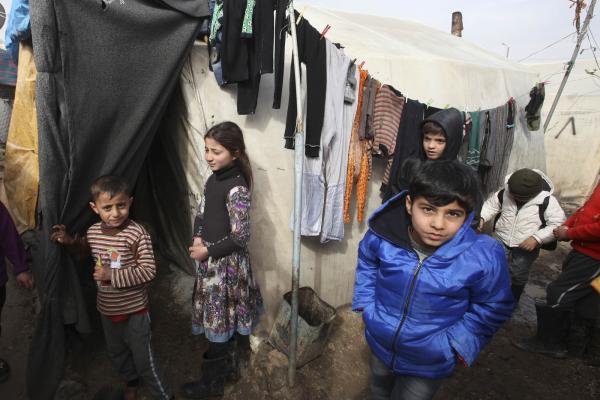On Dec. 14, Syrian pro-government forces breached the fragile ceasefire agreement, shelling besieged neighborhoods of Aleppo and banning civilians from fleeing. Addressing Syria, Iran, and Russia, the U.S. ambassador to the United Nations, Samantha Power, asked, “Are you incapable of shame? … Is there no execution of a child that gets under your skin? Is there literally nothing that shames you?”
Less than 24 hours after ambassador Power spoke before the U.N. security council accusing the Syrian government, along with Russia and Iran, of putting a “noose” around civilians in Aleppo, Syrian President Bashar al-Assad declared, "If Trump can genuinely fight against terrorism, he can be our natural ally." The individual responsible for the deaths of thousands of Syrian civilians just declared the president-elect of the United States a “natural ally.”
There would be no repercussions for Assad’s recent escalated atrocities against civilians, aside from verbal reprimands such as that from Power. Even Pope Francis’s letter to Assad, which was delivered to him on Dec. 12 by Cardinal Mario Zenari, the papal nuncio to Syria — appealing for an end to the violence, for a “peaceful resolution to the hostilities, condemning all forms of extremism and terrorism from whatever quarter they may come,” while ensuring “that international humanitarian law is fully respected to the protection of the civilians and access to humanitarian aid” — could be ignored.
Scholars of international relations contend that wars occur for three reasons: a resource is indivisible; actors lack complete information; and actors are unable to credibly commit. In civil wars, the challenge for actors to credibly commit becomes an almost intractable problem. If a deal is reached between combatants, the state must credibly commit to honor their agreement even as rebels commit to disarming. Third-party involvement further complicates the commitment and information problems, as outside actors bring their own interests to the conflict. The protracted and costly characteristics of the war in Syria are explained by commitment problems and third-party interests.
As the civil war in Syria escalated and the rebels fragmented and lost strategic advantage, Syrian non-combatants were increasingly targeted, not only by the government forces but also by various rebel organizations. The government engaged in more widespread violence, increasing the severity of weapons employed against civilians from tanks to artillery to chemical weapons, barrel bombs, cluster munitions, and Scud missiles. According to the Syrian Network for Human Rights (SNHR), 203,097 civilians were killed in Syria from March 2011 to November 2016.
For comparison the population of Fayetteville, N.C., is 201,899.
With the emergence of ISIS on April 9, 2013, the narrative of the civil war was hijacked. Policymakers and news outlets increasingly focused on extremist groups within Syria and human rights abuses committed by rebel groups. Focusing on rebel group characteristics, though important, obfuscated the importance of civilian abuses committed by the Assad regime.
According to the SNHR, pro-government forces and Russian military killed an estimated 188,729 and 3,558 civilians, respectively. Assad and his allies are responsible for approximately 95 percent of the total count of civilians killed. Comparatively, ISIS has killed 2,998 civilians — less than 1.5 percent of civilians killed.
Just over three years ago, when the horrific crimes against civilians in Syria initially caught our attention, and the United States considered striking Assad’s government forces, Pope Francis called for a day of prayer and fasting. Most Catholic theologians and ethicists — including those who teach and use just war theory — hoped that such nonviolent and just peace efforts would make a constructive difference. Although there was indeed a just cause — to defend the innocent against murderous aggression — most theological ethicists also worried that armed intervention would fail the just war criterion of proportionality; that is, military conflict will lead to greater evils than those that were already happening. More civilians would perish. They were damned if we do something militarily.
Now, as recent videos of wounded and dead children in Aleppo show, we of course wonder if we were wrong. The nonviolent and just peace alternatives that one of us hoped would materialize in Syria have fallen short. They were damned if we don’t do something militarily.
As one of us said at the time, "No one seems innocent in this current conflict — except for the children. I wish there was some way to take their side, on all sides." It’s a lose-lose predicament.
Undoubtedly, Power’s questions should be addressed to a broader audience.
Do we live in a post-shame global environment? If not, then it is our responsibility to raise our voice. The stakes are high not only for the civilians in Aleppo, but also the struggle for human rights. In our day, we must remember Aleppo. But how?
The present situation seems very much like what H. Richard Niebuhr wrote concerning possible military intervention in the Sino-Japanese conflict in the early 1930s in his famous Christian Century essay, “The Grace of Doing Nothing:” “We are chafing at the bit, we are eager to do something constructive; but there is nothing constructive, it seems, that we can do.” For him, the problem was “that of a choice between various kinds of inactivity rather than of choice between action and inaction,” and in his view the way of inaction that believes that God is at work in all this, even though we humans can do nothing constructive in it, calls us to repentance.
While we agree on the need for repentance — the U.S. is not morally pure, especially when considering our history in the Middle East — we find it hard to trust that somehow God is at work in what is happening on the ground in Syria.
We must pressure our elected leaders to take costly action against human rights abuses, indiscriminate targeting of civilians, torture, and extra-judicial killings.
We must help the refugees. We can also donate to groups that offer assistance on the ground, such as Catholic Relief Services, which provides food, shelter, education, medicine, and legal support for Syrian refugees.
Of course, we Christians can and should pray. That is not inaction. On Aug. 25, 2013, after the recitation of the Angelus, Pope Francis called for peace in Syria, praying to Mary, Queen of Peace, to pray for us. He added, “From the bottom of my heart, I would like to express my closeness in prayer and solidarity with all the victims of this conflict, with all those who suffer, especially children …”
But is such “closeness” enough for the suffering?
Maybe what needs to be done was seen in the example of Mother Teresa, now a saint, who also invoked the Queen of Peace in 1982 when she traveled to Beirut to rescue a group of disabled Muslim children from the fighting there after Israel had invaded Lebanon. Her presence momentarily disarmed the adversaries in a cease fire. Pacifist Christian ethicist Stanley Hauerwas once suggested during a lecture, prior to the outbreak of the Gulf War in 1991, something akin, namely, that Pope John Paul II should similarly go to Iraq. Pope Francis’s namesake, Saint Francis of Assisi, sought dialogue with the Muslim Sultan Malek al-Kamil during the Crusades, meeting face to face with him in 1219. Eight centuries later, let us pray that grace will make another such encounter possible.
Got something to say about what you're reading? We value your feedback!


